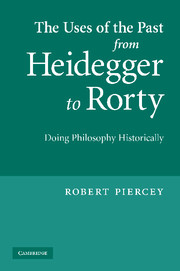Book contents
- Frontmatter
- Contents
- Acknowledgments
- List of abbreviations
- Introduction: The uses of the past
- 1 Doing philosophy historically
- 2 The role of narrative
- 3 Defending the historical thesis
- 4 The critical approach: MacIntyre
- 5 The diagnostic approach: Heidegger
- 6 The synthetic approach: Ricoeur
- Consequences
- References
- Index
6 - The synthetic approach: Ricoeur
Published online by Cambridge University Press: 31 August 2009
- Frontmatter
- Contents
- Acknowledgments
- List of abbreviations
- Introduction: The uses of the past
- 1 Doing philosophy historically
- 2 The role of narrative
- 3 Defending the historical thesis
- 4 The critical approach: MacIntyre
- 5 The diagnostic approach: Heidegger
- 6 The synthetic approach: Ricoeur
- Consequences
- References
- Index
Summary
This chapter deals with the third major approach to doing philosophy historically: what I have called the synthetic approach. The synthetic approach involves bringing together a number of different philosophical pictures, typically ones that are in tension with each other. It involves trying to reconcile these pictures, in the hope of developing an approach to philosophy that draws on the resources of both. The desire to synthesize pictures is widespread and understandable. Unlike philosophical theories, pictures are not the sorts of things that can be proved or refuted. An indefinite number may seem plausible and attractive. As a result, philosophers are often drawn to several major pictures at once, and they may find themselves unwilling to abandon any of them. Those who can show these pictures to be compatible by synthesizing them in their own work provide a valuable service.
The practitioner of the synthetic approach with whom I will be concerned is Paul Ricoeur. This should not be a surprising choice. Ricoeur is widely recognized as an unusually synthetic thinker, one whose work draws on an exceptionally broad range of influences. I will not try to discuss all of these influences. Instead, I will focus on Ricoeur's attempts to reconcile two of them: the pictures of reality articulated by Kant and Hegel. Ricoeur often calls himself a “post-Hegelian Kantian,” and his readers have long recognized that this notion is a valuable key for unlocking his work.
- Type
- Chapter
- Information
- The Uses of the Past from Heidegger to RortyDoing Philosophy Historically, pp. 164 - 205Publisher: Cambridge University PressPrint publication year: 2009



